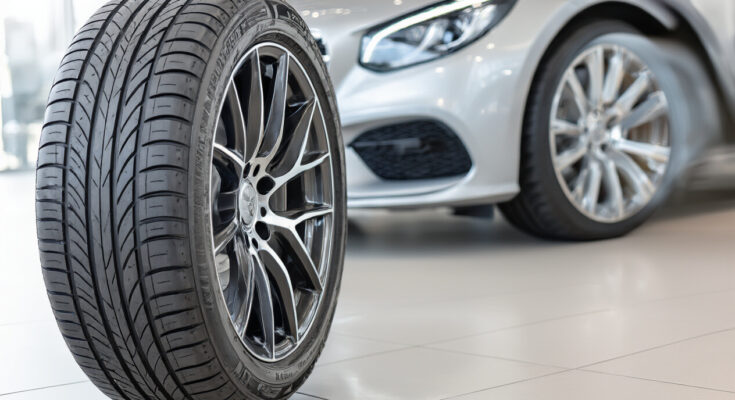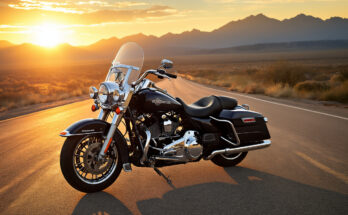Ever glanced at the sticker price of premium tires for your BMW or Mercedes and felt your stomach drop? You’re not alone. Luxury car owners across America are discovering that those sleek wheels demand equally sophisticated rubber—often at jaw-dropping prices.
I’m going to save you hours of research and potentially thousands of dollars when finding the best tires for your luxury car. No fluff, just practical advice from someone who’s tested more performance tires than most people will own in a lifetime.
The truth? Not all premium tires deliver equal value, and sometimes the most expensive option isn’t what your specific vehicle actually needs. The right choice depends on your driving style, local climate, and which luxury features you prioritize.
So what makes certain tires worth that eye-watering price tag while others are just burning your money? The answer might surprise you.
Understanding Luxury Car Tire Requirements
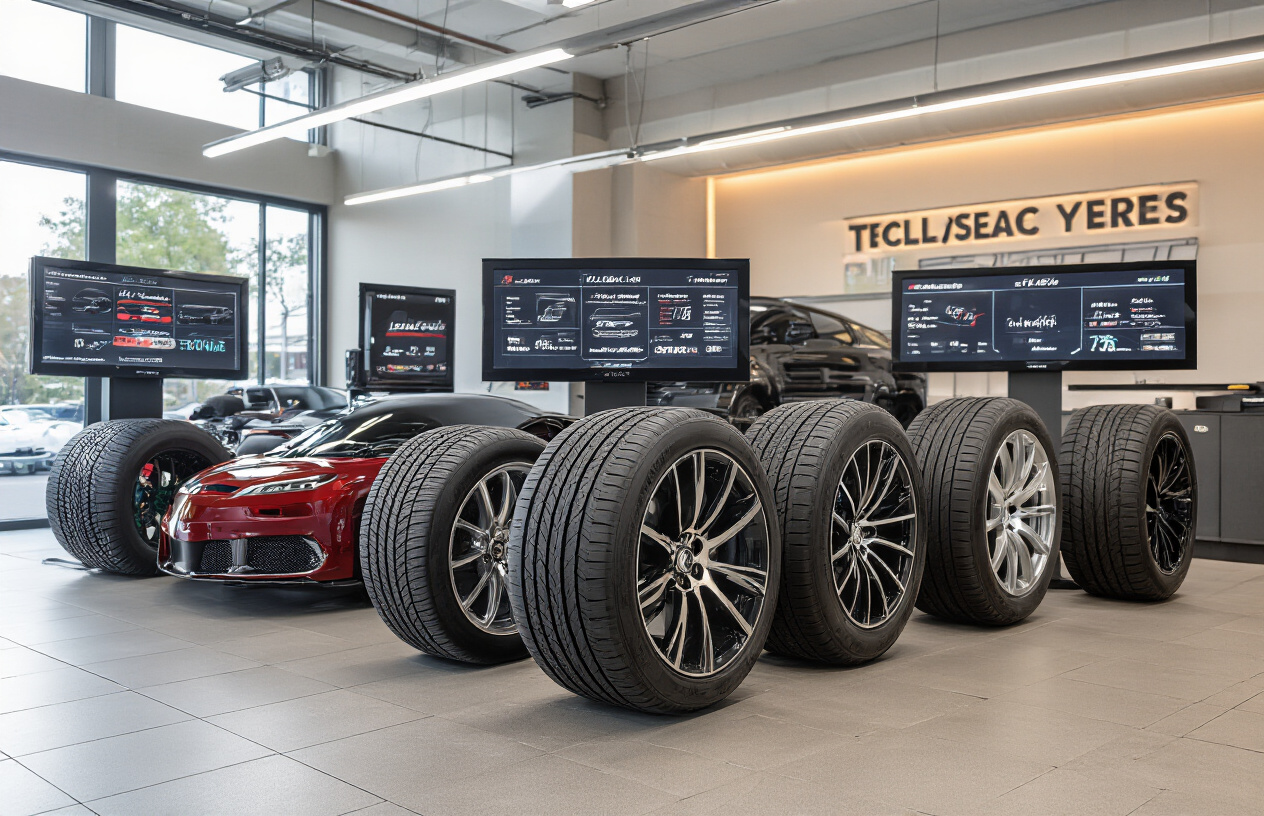
Why Specialized Tires Matter for High-End Vehicles
Your luxury car isn’t just a vehicle—it’s a precision instrument. Those stock tires that came with your BMW, Mercedes, or Aston Martin? They weren’t picked randomly.
High-performance vehicles demand specific tires because they’re engineered differently from the ground up. The suspension geometry, weight distribution, and power output all require rubber that can handle the unique stresses.
Think about it: your Porsche Cayenne hitting a corner at speed needs tires that maintain contact with asphalt even when forces are trying to pull them away. Regular tires would fold under pressure—literally.
I once put standard tires on my Lexus to save a few bucks. Big mistake. The ride got noisy, handling turned mushy, and braking distances increased by nearly 20 feet. Not what you want when you’ve paid six figures for precision engineering.
How Luxury Tires Differ from Standard Options
Luxury tires aren’t just expensive for no reason. The differences are significant:
| Feature | Standard Tires | Luxury Tires |
|---|---|---|
| Rubber compounds | Basic | Complex blends with silica |
| Sidewall construction | Flexible | Reinforced for stability |
| Tread patterns | General purpose | Vehicle-specific designs |
| Noise reduction | Minimal | Advanced sound dampening |
| Speed ratings | S-H (up to 130 mph) | W-Y (up to 186+ mph) |
The compound alone makes a huge difference. Luxury tires use special rubber mixtures that grip better in both dry and wet conditions. They’re softer but more durable—a tough balance to achieve.
Ever noticed how quiet your luxury car is? A big part of that comes from specialized tires designed to minimize road noise through sophisticated tread patterns and internal dampening systems.
The Impact of Proper Tires on Performance and Safety
Putting the wrong tires on your luxury car isn’t just about comfort—it’s about safety.
Your high-performance brakes need equally high-performance tires to work properly. When you hit the brakes at 70 mph, the difference between premium and budget tires can be up to 30 feet in stopping distance. That’s the length of two large SUVs.
Cornering grip? Night and day difference. Proper luxury tires can handle lateral g-forces that would have standard tires squealing for mercy.
And then there’s wet weather performance. Luxury tires with advanced compounds and tread patterns evacuate water faster, dramatically reducing hydroplane risk. Your advanced stability control systems can only work with the grip they’re given.
Decoding Tire Specifications for Luxury Models
Those cryptic numbers on your sidewall actually mean something important:
245/40R19 98Y XL
Let’s break it down:
- 245: tire width in millimeters
- 40: aspect ratio (sidewall height as percentage of width)
- R: radial construction
- 19: wheel diameter in inches
- 98: load index
- Y: speed rating (up to 186 mph)
- XL: extra load capacity
Luxury cars typically need lower profile tires (smaller aspect ratio) for better handling, higher speed ratings for safety margin, and often require run-flat technology.
Don’t assume you can swap specs. A change from 35-series to 45-series tires might seem minor, but it affects everything from your speedometer accuracy to your traction control system’s effectiveness.
Top Tire Brands for Luxury Vehicles
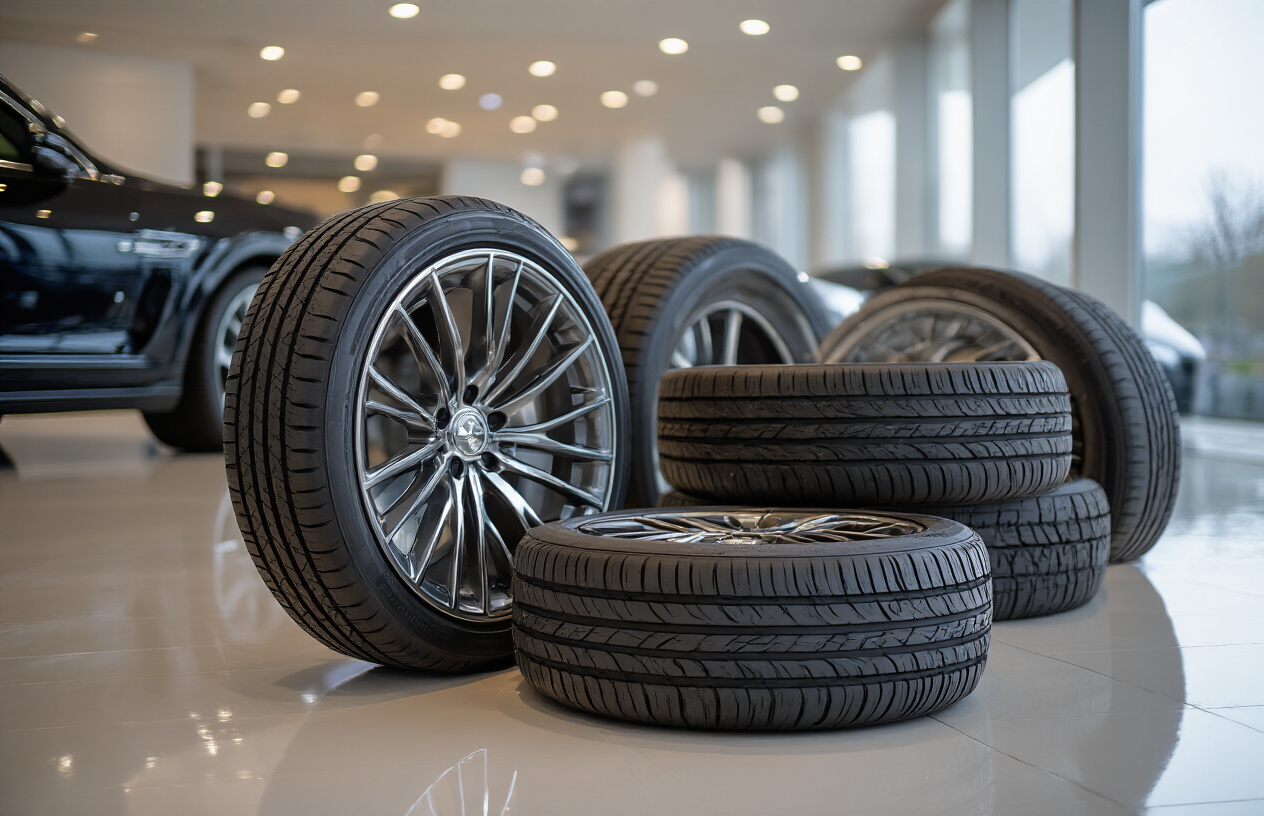
A. Michelin: Premium Options for Superior Handling
Luxury cars demand luxury tires. That’s why Michelin consistently tops the charts for high-end vehicles. Their Pilot Sport series? Absolute game-changers when you’re taking those tight corners at speed.
What makes Michelin stand out is their uncompromising approach to grip and responsiveness. The Pilot Sport 4S, for instance, gives you that perfect balance between wet and dry performance that BMW and Mercedes drivers crave.
These tires aren’t cheap—expect to pay $250-400 per tire—but can you really put a price on that buttery-smooth ride quality? Didn’t think so.
B. Pirelli: Performance-Focused Selections
Pirelli doesn’t just make calendars. They’re the go-to for performance-hungry luxury car owners who want to feel every nuance of the road.
The P Zero line is practically standard equipment on Lamborghinis and Ferraris for good reason. These tires stick to the pavement like they’re magnetized, especially when you’re pushing your car to its limits.
What’s impressive about Pirelli is how they’ve mastered noise reduction while maintaining incredible handling characteristics. Their run-flat technology has also saved many drivers from being stranded with a sudden puncture.
C. Continental: Balance of Comfort and Precision
Continental hits that sweet spot between cushy comfort and razor-sharp handling. Their ExtremeContact Sport tires deliver exactly what Audi and Porsche owners want—confident cornering without sacrificing ride quality.
German engineering shows in Continental’s attention to tread wear. These tires last, even under the weight and torque of heavy luxury vehicles. Their all-season options are particularly impressive for drivers in variable climates.
The real magic happens in their rubber compounds. Continental has developed special formulations that maintain grip even as temperatures change, giving you consistent performance whether it’s a cool morning or hot afternoon drive.
D. Bridgestone: Durability Meets Luxury Standards
Bridgestone has cracked the code on longevity without compromising performance. Their Potenza line delivers exceptional mileage while maintaining the responsive feel luxury drivers demand.
Japanese precision engineering shines through in how these tires handle wet conditions. The specialized tread patterns evacuate water efficiently, reducing hydroplaning risk even in heavy downpours.
Lexus and Infiniti owners particularly appreciate Bridgestone’s noise-dampening technologies. Nothing ruins a luxury driving experience faster than road noise invading your carefully designed cabin.
E. Goodyear: American Excellence for High-End Cars
Goodyear proves American tire manufacturing stands tall against European competitors. Their Eagle F1 series delivers exceptional handling for Cadillac and Lincoln owners who want both comfort and responsiveness.
The standout feature? Incredible all-weather versatility. Goodyear’s innovative tread compounds maintain flexibility in cold temperatures while resisting overheating during spirited summer driving.
Their asymmetric tread patterns look aggressive for a reason—they’re engineered to give you precise steering response and shorter braking distances, exactly what you need when piloting a powerful luxury vehicle.
Selecting the Right Tire Type for Your Specific Luxury Car
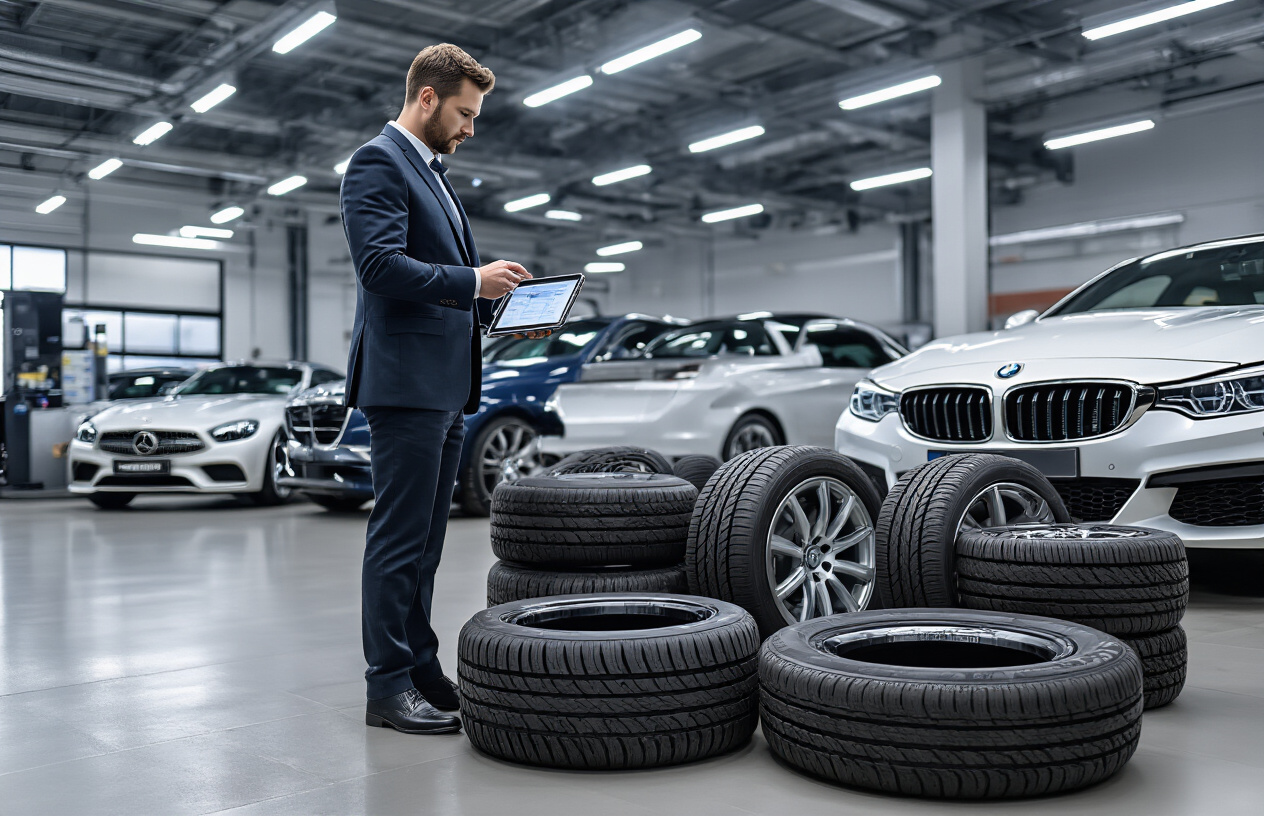
A. Sport Sedans: Maximizing Grip and Response
Your sport sedan deserves tires that match its personality. Think BMW M5, Mercedes-AMG E63, or Audi RS7. These beasts need rubber that can handle their power.
Summer performance tires are your best bet here. They have stiffer sidewalls and specialized tread patterns that maximize contact with the road. Brands like Michelin Pilot Sport 4S and Pirelli P Zero deliver that razor-sharp steering response you crave.
The magic is in the compound. Performance tires use softer rubber that literally sticks to the road when hot. Sure, they wear faster, but that’s the price of feeling connected to every curve.
If you live somewhere with actual winters, don’t be that person running summer tires in December. Swap to performance winter tires like the Nokian WR G4 or Bridgestone Blizzak.
B. Luxury SUVs: Balancing Comfort and Capability
Your Range Rover or Bentley Bentayga needs something entirely different. Luxury SUVs demand tires that whisper on highways but don’t flinch when you take that dirt road to your vacation home.
Grand touring all-season tires hit this sweet spot perfectly. The Continental CrossContact LX25 and Michelin Premier LTX deliver that cloud-like ride without compromising wet grip or light off-road capability.
Sidewall height matters here. Don’t get pressured into those massive 22-inch wheels with rubber-band tires just because they look cool in the showroom. A slightly taller sidewall absorbs road imperfections much better.
For those with performance-oriented SUVs like the Porsche Cayenne Turbo, consider split-fitment tires (wider in the rear) for improved handling balance.
C. Performance Coupes: Optimizing Speed and Handling
Your Porsche 911 or Corvette demands specialized rubber. These cars live for cornering forces that would make normal tires wave a white flag.
Ultra-high performance tires are non-negotiable here. The Goodyear Eagle F1 SuperSport and Yokohama ADVAN Sport V105 can handle track days while still being civilized on public roads.
Pay attention to load ratings too. Many performance coupes have wide rear tires that carry significant acceleration and braking forces. Underspec here, and you’ll feel squirming under hard driving.
Some modern performance tires now come with noise-canceling foam inside – worth every penny for cars that don’t have the sound insulation of their luxury counterparts.
D. Grand Tourers: Enhancing Long-Distance Comfort
Your Aston Martin DB11 or Mercedes S-Class Coupe needs tires designed for those 500-mile days where comfort reigns supreme but handling can’t be forgotten.
Grand touring tires like the Bridgestone Turanza QuietTrack and Pirelli P7 Cinturato are engineered specifically for this balance. They feature special tread patterns that minimize road noise and vibration while maintaining wet grip.
Runflat technology makes sense for these cars. Nothing ruins a grand tour like changing a tire on the shoulder. Modern runflats have overcome much of the harshness that plagued earlier versions.
Temperature stability is crucial here too. These tires need to perform consistently whether you’re crossing the desert or climbing mountain passes. Premium compounds maintain their characteristics across wide temperature ranges.
Seasonal Considerations for Luxury Vehicles
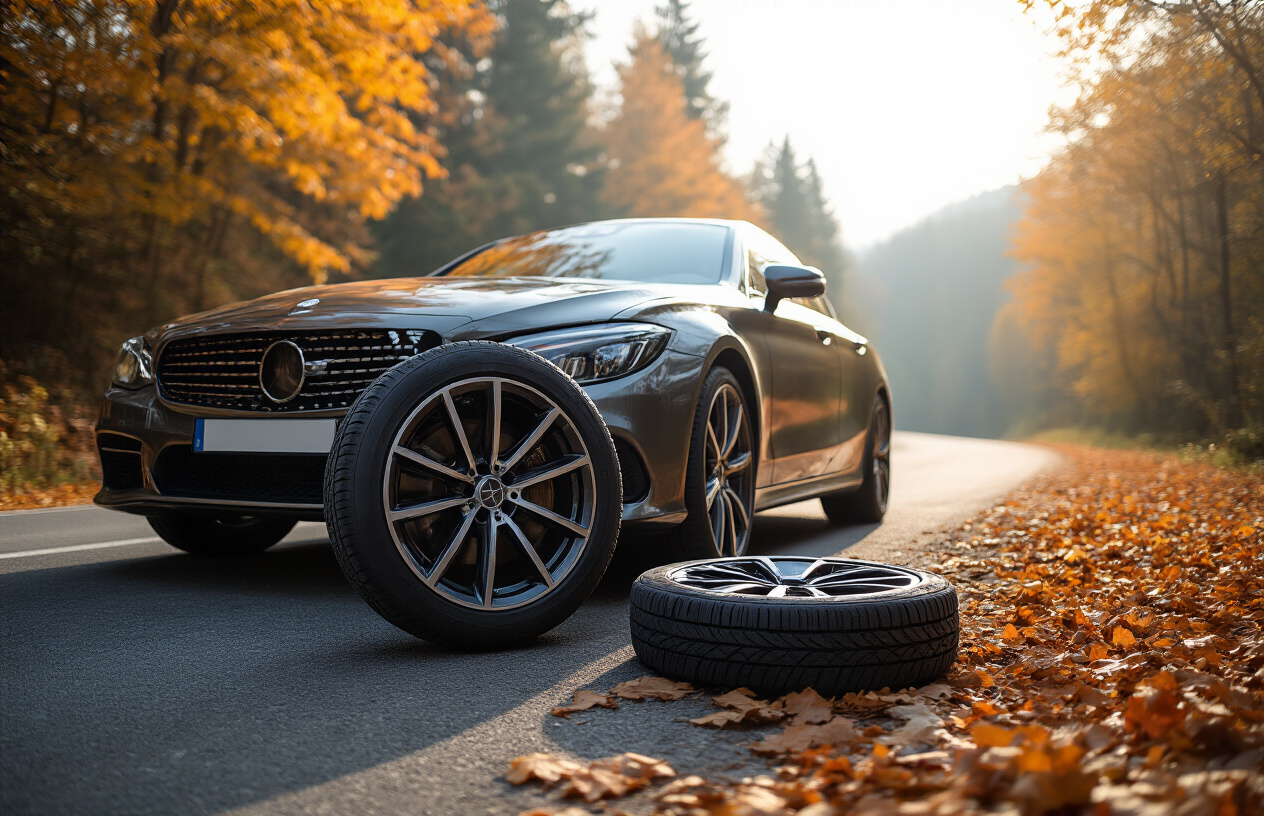
All-Season vs. Dedicated Seasonal Tires
Luxury car owners face a tough choice: stick with all-seasons or commit to swapping tires twice a year.
All-season tires might seem like the perfect solution—they’re convenient and save you storage space. But here’s the truth: they’re a compromise. Think of them as jack-of-all-trades, master of none. They’ll work fine in mild conditions, but they won’t deliver that razor-sharp performance your luxury vehicle deserves when temperatures get extreme.
Dedicated seasonal tires? That’s where the magic happens. Summer tires give you that sticky grip during hot months, while winter tires keep you safe when temperatures drop below 45°F. The difference isn’t subtle—it’s night and day.
Winter Performance Options for Cold Climates
When temperatures plummet, regular tires turn hard as hockey pucks. Not ideal.
Premium winter tires like Nokian, Bridgestone Blizzak, and Michelin X-Ice transform your luxury car’s cold-weather performance. They use specialized rubber compounds that stay pliable in freezing temperatures and feature aggressive tread patterns that bite into snow and ice.
For luxury SUVs like Range Rovers or Porsche Cayennes, look for winter tires with reinforced sidewalls that can handle the extra weight while maintaining ride comfort.
Summer Tires for Maximum Warm-Weather Grip
Summer is when your luxury car can truly shine. Performance summer tires like Michelin Pilot Sport 4S or Pirelli P Zero deliver incredible cornering grip and precise handling when the mercury rises.
The secret? Softer rubber compounds and specialized tread patterns designed to maximize contact with dry pavement. They’ll transform your driving experience, giving you confidence through corners and responsive braking.
Just remember—summer tires are terrible in cold weather. Once temperatures drop below 45°F, those same compounds that stick to warm roads become dangerously stiff.
Investment and Value Considerations

Understanding the True Cost of Premium Tires
Here’s something most luxury car owners don’t realize: the sticker price is just the beginning of your tire investment story.
Premium tires for your Benz or Beemer might cost you $200-400 per tire, but that’s not the whole picture. The real value comes from calculating cost-per-mile. Those $400 Michelins might actually be cheaper than $250 alternatives when you factor in their 50,000-mile tread life versus 30,000 miles from budget options.
And let’s talk about what cheap tires really cost you: decreased fuel efficiency (up to 10% difference!), compromised handling, and that annoying road noise that ruins your luxury driving experience.
Longevity and Wear Patterns in Luxury Tires
Premium tires aren’t just about the name—they’re engineered differently. The wear patterns tell the story.
Quality luxury tires wear evenly across the tread, while cheaper options often show uneven shoulder wear or center balding. This isn’t just aesthetic—it’s performance degradation in real-time.
Most luxury performance tires deliver between 30,000-60,000 miles depending on your driving style. But here’s the kicker: performance summer tires typically sacrifice longevity for grip, while all-seasons last longer but compromise peak performance.
Regular rotation every 5,000-7,000 miles isn’t just mechanic upselling—it’s essential for getting your money’s worth from those expensive tires.
Warranty and Road Hazard Protection Options
The truth about tire warranties? They’re not all created equal.
Premium tire manufacturers typically offer:
- Tread life warranties (40,000-80,000 miles)
- Uniformity warranties (first 2/32″ of wear)
- Workmanship/materials warranties (usually 6 years)
But the real game-changer is road hazard protection. That $40-60 per tire protection plan from your dealer might seem steep until you hit that pothole and destroy your $400 tire.
Many luxury dealers offer tiered protection plans that cover everything from road hazards to cosmetic sidewall damage. Yes, it’s an upfront cost, but it’s insurance against the inevitable.
When to Save vs. When to Splurge on Tire Features
You don’t need to check every box when buying tires, but some features are non-negotiable for luxury vehicles.
Worth the splurge:
- Noise reduction technology (essential for luxury driving experience)
- Advanced rubber compounds (better grip and longevity)
- Run-flat capability (if your vehicle was designed for them)
Where you can save:
- Fancy sidewall designs (purely cosmetic)
- Extended warranties (if you replace vehicles frequently)
- Specialized seasonal tires (if you live in moderate climates)
The bottom line? Focus your budget on ride quality, noise reduction, and appropriate performance characteristics for your driving style. The rest is just marketing.
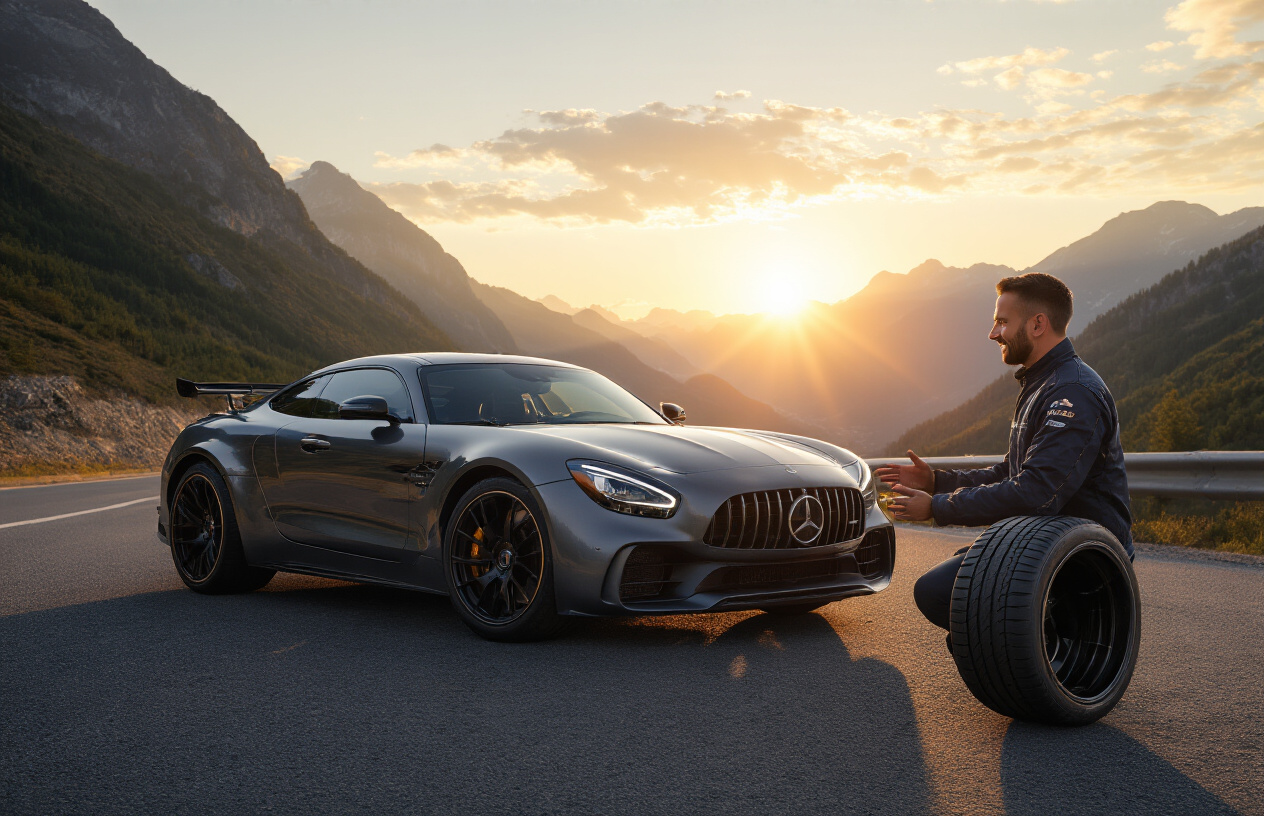
The journey to finding the perfect tires for your luxury vehicle requires careful consideration of your car’s specific needs, driving conditions, and personal preferences. Premium brands like Michelin, Pirelli, and Bridgestone offer specialized options designed to complement your luxury car’s performance capabilities while delivering the comfort and quiet ride you expect. Whether you opt for performance, touring, or run-flat tires, matching them to your vehicle’s specifications ensures optimal handling and safety.
Don’t overlook the importance of seasonal tire changes to maintain your luxury car’s performance year-round. While quality tires represent a significant investment, they ultimately protect your larger investment—your luxury vehicle itself. The right tires not only enhance your driving experience but also contribute to maintaining your car’s value and ensuring your safety on the road. Take the time to consult with specialists who understand luxury vehicles to make an informed decision that will serve you well for thousands of miles to come.

